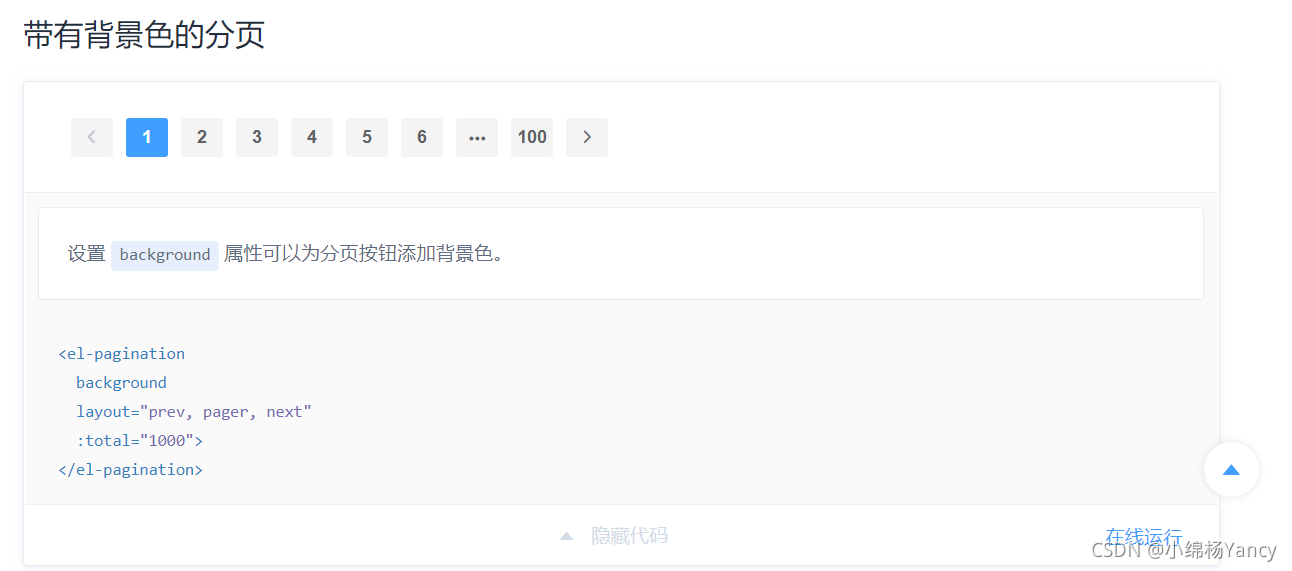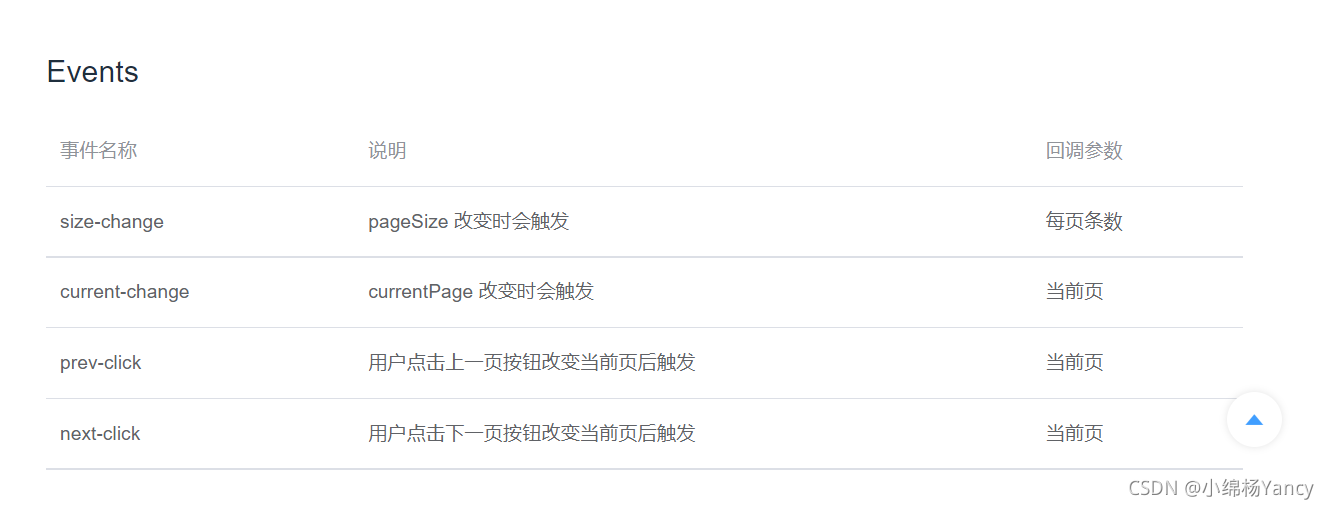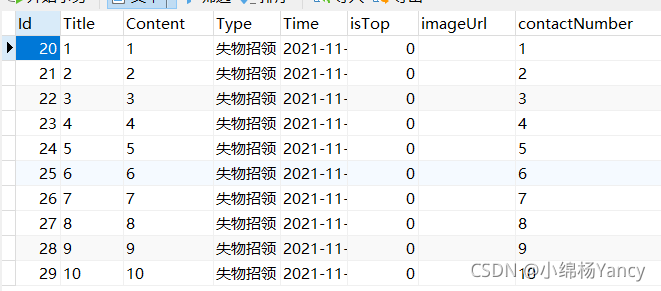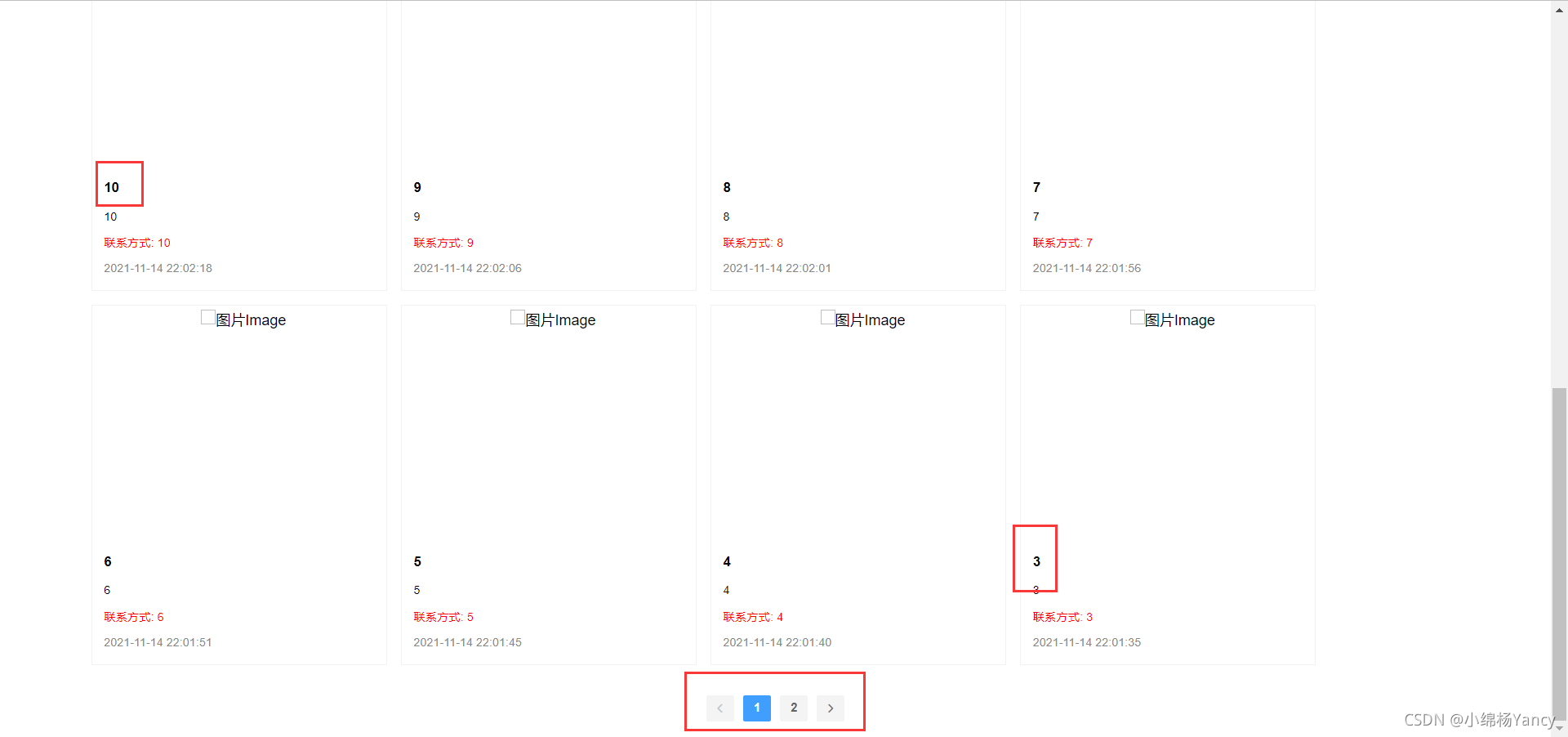How Vue+ElementUI implements paging function to query mysql data
1. Problem
When there is a lot of data in the database, only a part of it must be queried at a time to relieve the pressure on the server and the page. Here we use the Pagination component of elementui and the limit statement of mysql to implement paging query of mysql data.
The following picture is the most basic paging style:

Of course, corresponding events need to be introduced to achieve page changes. Just query the database.

2. Solve
2.1 Paging component
<el-pagination
background
layout="prev, pager, next"
:page-size="8"
:total="total"
:current-page="pageNum"
@current-change="handleCurrentChange">
</el-pagination>data: Initialize the total number of data items (total) is 1, pageNum means that the current page number is the first page.

2.2 Function to obtain database data: getData():
The parameters are offset, limit, request data from the backend, explained later. The qs serialization parameters are used here. You can refer to my other blog: Vue ElementUI ViewerThe picture cannot be previewed after turning the page. The problem of asynchronous communication between Vue parent and child components explains the function of qs.
getData(offset,limit){
this.axios.post('/php/select.php', qs.stringify({
offset: offset,
limit: limit,
type: '失物招领'
}), { headers: { 'Content-Type': 'application/x-www-form-urlencoded' } }).then((res) => {
if(res.data === 0){
this.total = 0;
this.list = [];
return;
}
this.total = res.data.total
this.list = res.data.data
this.loading = false
}).catch((err) => {
this.$message.error(err)
})
}2.3 The page is loaded and the data of the first page needs to be requested
created () {
this.getData(0,8);
},Page change triggers the handleCurrentChange() function, that is, click to turn the page, where the val parameter is Current page number, use new parameters,
Call getData to query data on different pages:
handleCurrentChange(val){
this.list = [] //清空上一页数据
this.getData((val-1)*8,8);
}The following is the back-end data: php mysql<br/>
There are now a total of 10 pieces of data in the data table:

Front endgetDatarequest The select.php file
select.php:
<?php
$servername = "localhost";
$username = "用户名";
$password = "密码";
$dbname = "数据库名称";
// 创建连接
$conn = new mysqli($servername, $username, $password, $dbname);
// Check connection
if ($conn->connect_error) {
die("连接失败: " . $conn->connect_error);
}
$type = $_POST['type'];
//获取前端的参数 开始和结束number
if ( !isset( $_POST['offset'] ) ) {
echo 0;
exit();
};
$offset = ( int )$_POST['offset'];
if ( !isset( $_POST['limit'] ) ) {
echo 0;
exit();
};
$limit = ( int )$_POST['limit'];
//分页查询数据库
$sql = "SELECT * FROM posts where type='$type' order by id desc LIMIT $limit OFFSET $offset";
$result = $conn->query($sql);
$sqlGetCount = "SELECT COUNT(*) cnt FROM posts where type='$type'";
$rescnt = $conn->query($sqlGetCount);
$rescnt = $rescnt->fetch_assoc();
$arr = array();
if ($result->num_rows > 0) {
while ( $row = $result->fetch_assoc() ) {
array_push( $arr, $row );
}
//echo json_encode( $arr, JSON_UNESCAPED_UNICODE );
echo json_encode(array_merge(array('data'=>$arr),array('total'=>(int)$rescnt['cnt'])));
} else {
echo 0;
}
mysqli_close( $conn );
?>## of mysql is used here #limit implements querying only a part of the data at a time, and the parameters offset and limit are passed from the front end.
sql statement:
"SELECT * FROM posts where type='$type' order by id desc LIMIT $limit OFFSET $offset"
LIMIT $limit OFFSET $offset means starting from the value of $offest, query $limit pieces of data.
For example $limit = 8, $offest = 0: means querying the first 8 pieces of data in the database, starting from 0 (excluding 0, the mysql index starts from 0), Query 8 items, that is, 1~8 pieces of data.
When I click on the second page: Trigger handleCurrentChange() Function:

val=2, then offest = 8, limit = 8. The 9th to 17th data will be queried. If there is no 17th data, all data after the 9th data will be returned. For example, my database currently only has 10 pieces of data, so the 9th and 10th pieces of data will be returned.
At the same time, the page in select.php returns the total number of data total:
SELECT COUNT(*) cnt FROM posts where type='$type'

total value is assigned to this.total (it is bound to the total attribute of Pagination, which is the total number of data items). PaginationAccording to the:page-size="8"property, the data will be automatically paginated. For example, if the total returned by the backend is 10, it will be divided into two pages.

The page is loaded: Because I was querying in reverse order based on the id, I got the 3rd ~10 pieces of data (8 pieces in total).

Click the second page or page turn button: Get the 1st and 2nd data.

Note: Your limit parameter must be consistent with the page-size of Pagination The attributes are consistent, which means one page of data is queried at a time. And offset is the current page number.
The above is the detailed content of How Vue+ElementUI implements paging function to query mysql data. For more information, please follow other related articles on the PHP Chinese website!

Hot AI Tools

Undresser.AI Undress
AI-powered app for creating realistic nude photos

AI Clothes Remover
Online AI tool for removing clothes from photos.

Undress AI Tool
Undress images for free

Clothoff.io
AI clothes remover

Video Face Swap
Swap faces in any video effortlessly with our completely free AI face swap tool!

Hot Article

Hot Tools

Notepad++7.3.1
Easy-to-use and free code editor

SublimeText3 Chinese version
Chinese version, very easy to use

Zend Studio 13.0.1
Powerful PHP integrated development environment

Dreamweaver CS6
Visual web development tools

SublimeText3 Mac version
God-level code editing software (SublimeText3)

Hot Topics
 MySQL's Role: Databases in Web Applications
Apr 17, 2025 am 12:23 AM
MySQL's Role: Databases in Web Applications
Apr 17, 2025 am 12:23 AM
The main role of MySQL in web applications is to store and manage data. 1.MySQL efficiently processes user information, product catalogs, transaction records and other data. 2. Through SQL query, developers can extract information from the database to generate dynamic content. 3.MySQL works based on the client-server model to ensure acceptable query speed.
 How to start mysql by docker
Apr 15, 2025 pm 12:09 PM
How to start mysql by docker
Apr 15, 2025 pm 12:09 PM
The process of starting MySQL in Docker consists of the following steps: Pull the MySQL image to create and start the container, set the root user password, and map the port verification connection Create the database and the user grants all permissions to the database
 Laravel Introduction Example
Apr 18, 2025 pm 12:45 PM
Laravel Introduction Example
Apr 18, 2025 pm 12:45 PM
Laravel is a PHP framework for easy building of web applications. It provides a range of powerful features including: Installation: Install the Laravel CLI globally with Composer and create applications in the project directory. Routing: Define the relationship between the URL and the handler in routes/web.php. View: Create a view in resources/views to render the application's interface. Database Integration: Provides out-of-the-box integration with databases such as MySQL and uses migration to create and modify tables. Model and Controller: The model represents the database entity and the controller processes HTTP requests.
 Netflix's Frontend: Examples and Applications of React (or Vue)
Apr 16, 2025 am 12:08 AM
Netflix's Frontend: Examples and Applications of React (or Vue)
Apr 16, 2025 am 12:08 AM
Netflix uses React as its front-end framework. 1) React's componentized development model and strong ecosystem are the main reasons why Netflix chose it. 2) Through componentization, Netflix splits complex interfaces into manageable chunks such as video players, recommendation lists and user comments. 3) React's virtual DOM and component life cycle optimizes rendering efficiency and user interaction management.
 Solve database connection problem: a practical case of using minii/db library
Apr 18, 2025 am 07:09 AM
Solve database connection problem: a practical case of using minii/db library
Apr 18, 2025 am 07:09 AM
I encountered a tricky problem when developing a small application: the need to quickly integrate a lightweight database operation library. After trying multiple libraries, I found that they either have too much functionality or are not very compatible. Eventually, I found minii/db, a simplified version based on Yii2 that solved my problem perfectly.
 Laravel framework installation method
Apr 18, 2025 pm 12:54 PM
Laravel framework installation method
Apr 18, 2025 pm 12:54 PM
Article summary: This article provides detailed step-by-step instructions to guide readers on how to easily install the Laravel framework. Laravel is a powerful PHP framework that speeds up the development process of web applications. This tutorial covers the installation process from system requirements to configuring databases and setting up routing. By following these steps, readers can quickly and efficiently lay a solid foundation for their Laravel project.
 MySQL and phpMyAdmin: Core Features and Functions
Apr 22, 2025 am 12:12 AM
MySQL and phpMyAdmin: Core Features and Functions
Apr 22, 2025 am 12:12 AM
MySQL and phpMyAdmin are powerful database management tools. 1) MySQL is used to create databases and tables, and to execute DML and SQL queries. 2) phpMyAdmin provides an intuitive interface for database management, table structure management, data operations and user permission management.
 MySQL vs. Other Programming Languages: A Comparison
Apr 19, 2025 am 12:22 AM
MySQL vs. Other Programming Languages: A Comparison
Apr 19, 2025 am 12:22 AM
Compared with other programming languages, MySQL is mainly used to store and manage data, while other languages such as Python, Java, and C are used for logical processing and application development. MySQL is known for its high performance, scalability and cross-platform support, suitable for data management needs, while other languages have advantages in their respective fields such as data analytics, enterprise applications, and system programming.






